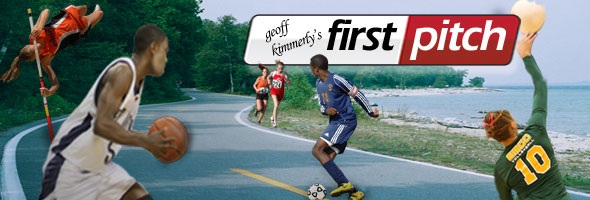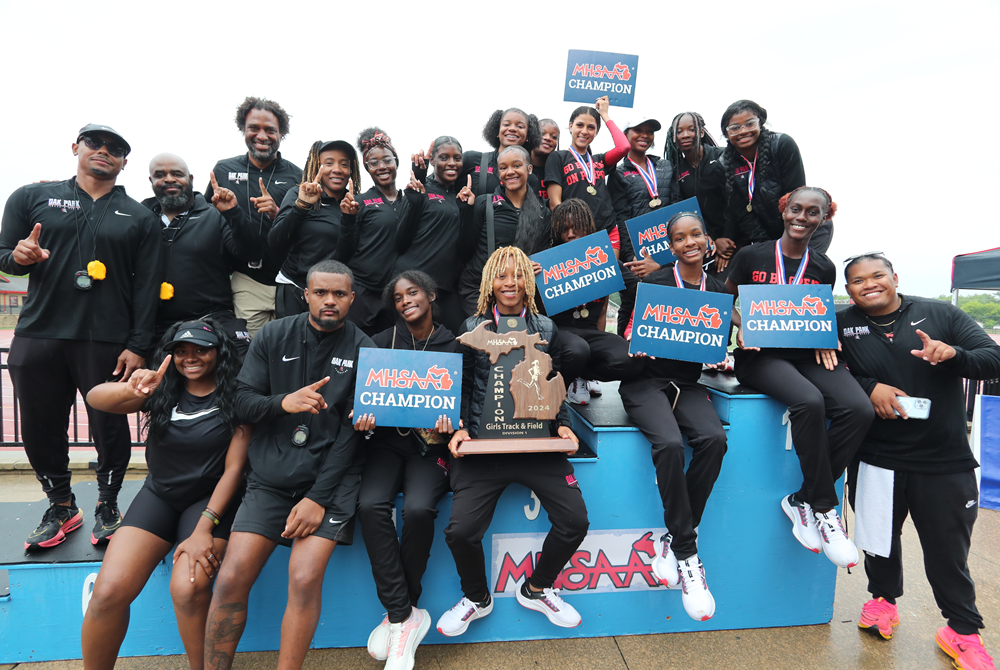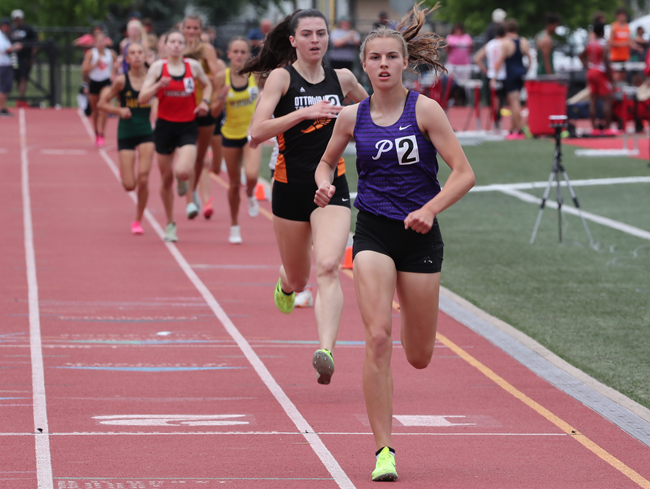
Keep on Coaching
February 1, 2013
By Geoff Kimmerly
Second Half editor
A few weeks ago, I finally got my first chance this season to watch a friend coach his basketball team. After guiding some others at the lower levels, this is his first time running the varsity – something he wasn't sure he wanted to do with a 1-year-old just learning to walk, but a challenge he ended up taking on to the benefit of all those involved.
Simply put, he’s good. I've seen a lot of teams and a lot of coaches over the past 15 years, and although I wouldn't know much of what to do if I were walking the sideline, I felt pretty qualified in telling him I was impressed – even if he didn't buy that I was offering an unbiased opinion. The best news is he’s gone from not sure about this a few months ago to talking about next season.
We know, at least anecdotally, that coaching continues to get more challenging. The time commitment has grown substantially to make running a program a year-round endeavor in a lot of sports at a lot of schools.
That commitment – especially for coaches with children of their own – was a main reason referred to in a New Haven Post-Chronicle story Saturday that noted 23 football coaching openings in Connecticut at one point this offseason. That state has 146 football teams – meaning roughly 15 percent will have new leaders this fall.
And that got me thinking about my friend, about how glad I am he’s given this a shot, and how I've seen so many others either not do so, or not stick around long despite having some pretty nice success.
A study published last winter in Interscholastic Athletic Administration magazine – a product of the National Interscholastic Athletic Administrators Association – noted some predictable results of a study that sought to determine the biggest challenges faced by first-year high school coaches.
The toughest according to the study was balancing the demands of coaching and teaching, experienced by nearly half the respondents – 98 percent of which coached high school teams and 81 percent of which are teachers.
The next six reasons all were noted by at least 30 percent of those in the study – personal fatigue, securing community support, securing and caring for facilities and equipment, parental contact, keeping non-starting players motivated, dealing with schedule interruptions and motivating athletes to achieve consistent, peak performance.
Nothing there is earth-shaking, and most if not all of these challenges are faced by high school coaches regardless of how long they've been in the field. But I got a little more perspective from some of the 32 items that ranked as least challenging to the first-year leaders – keeping in compliance with state and league regulations, dealing with substance abuse issues, teaching sport skills and creating a positive team atmosphere – things that seem most important, and yet appear to be easiest to do. I’m not sure what that tells us – but I think it tells us something.
Click to check out the entire three-page breakdown of the study, plus the researchers’ recommendations to remedy some of what first-year coaches face.
Giving back to Saginaw
I love reading about high-level athletes – like a star-studded group of alums from Saginaw – giving back to where they got their starts.
Pittsburgh Steelers star LaMarr Woodley made a big impact before the start of this school year by donating $60,000 to cover all participation fees for athletes in his former school district. The Saginaw News’ Hugh Bernreuter writes today about how Woodley (Saginaw High), the Philadelphia 76ers’ Jason Richardson (Saginaw Arthur Hill) and former Oakland Raiders standout Stu Schweigert (Saginaw Heritage) have combined to give more than $865,000 back to their home communities.
Bernreuter also mentions the non-monetary contributions of the Golden State Warriors’ Draymond Green (Saginaw High) and former Indianapolis Colts receiver Blair White (Saginaw Nouvel).
Click to read more about it.
Quote(s) of the Week
While rifling through more papers on my desk, I found an article from the Washington Post from Sept. 2011 titled “How high school sports save our schools.” I was drawn to it in part because I spent more than a decade in a newsroom, and it was a piece by a reporter covering education who instead of reporting on school boards and the like, delved into the importance of interscholastic athletics to education as a whole.
He spoke of how participation continues to grow even as resources dwindle, and of data supporting that extracurriculars like sports are more effective than academic classes in teaching leadership, teamwork, time management and “other skills crucial for success in the workplace.” Later, he mentioned a study noting that those who participate in extracurriculars earned more a decade later.
Click here to read the entre piece. These passages struck me most.
“Coaches might be the only faculty members still allowed by our culture and educational practice to get tough with students not making the proper effort. They have the advantage of teaching what are essentially elective non-credit courses. They can insist on standards of behavior that classroom teachers often cannot enforce because the stakes of dismissing or letting students drop their courses are too high. …
“Students do better in activities they choose. If we provide more of them, led by committed adults … that can make a difference. We know the bad news about education. Dropout rates are high. Achievement scores are stagnant. But sports participation is going up, despite pressure to cut it back. Let’s cheer about that and look for a way to draw in more students.”

Oak Park, Returning Individual Champs Lead Chase Again at Star-Filled Finals
By
Steve Vedder
Special for MHSAA.com
June 1, 2024
Abby Russell has no problem throwing as the favorite with everyone else hoping to catch her.
In fact, the Allen Park senior embraces summoning up her best efforts in both the discus and shot put every time she lines up to throw. Russell said she's never equated success with the pressure of being a state champion.
"To be honest, no," said Russell, who closed out a stellar career by winning those two events at Saturday's Lower Peninsula Division 1 Finals at East Kentwood. "I just focus on myself. Going to see a sports psychologist has helped me a lot with that. We talk about the work you have to put in, and (success) being a consistency thing."
Whether it's pure talent or seeking professional guidance or the ability to deal with pressure, Russell finished off an outstanding career in winning the discus (156-6) and the shot (46-10) on Saturday. The two titles are added to a first as a sophomore and third as a junior in the shot. She's now a three-time champ in the discus.
The wins at East Kentwood were also personally rewarding to Russell, who didn't place in the shot as a freshman at Falcon Stadium. It's one of the few places where the University of Michigan-bound Russell figures she could have done better.
"I was real bad as a freshman, so I was happy to get back here again," she said. "I had a great time back then. I just didn't do what I wanted."
While Russell was among those dominating the individual meet Saturday, Oak Park was sweeping its way to a team title. The Knights finished with 88 points to easily outdistance runner-up Ann Arbor Pioneer's 42. Detroit Renaissance was third with 35 points, East Kentwood was fourth with 34 and Saginaw Heritage had 30.
Oak Park coach Brandon Jiles, whose team collected its eighth Finals title under his leadership, said he wasn't sure what type of showing a young team would make Saturday. Of the 35 athletes on the roster, just three are seniors.
Still, Jiles thought the team would be in the hunt along with Pioneer, Renaissance and Detroit Cass Tech. At least part of the success was winning the 800 (1:38.10), 400 (47.53) and 1,600 (3:47.99) relays. The other firsts were by senior Morgan Roundtree in the 300 hurdles (41.31), freshman Nevaeh Burns in the 400 (55.02) and senior Kylee King (2:10.53) in the 800.
 "We thought we had a shot. We just take it one event at a time and do what we have to do. We only have three seniors, but they're really good kids. We'll have some good girls back next year, and they know they'll have to step up and score," Jiles said.
"We thought we had a shot. We just take it one event at a time and do what we have to do. We only have three seniors, but they're really good kids. We'll have some good girls back next year, and they know they'll have to step up and score," Jiles said.
"I'm a very competitive person when I see other teams that are good. I think the girls are like that too. We're ready when it comes to championship time."
Roundtree said her two chief goals at the meet were accomplished. She wanted to join a long list of successful Oak Park sprinters while also leading a young team to a championship.
"I want to motivate my teammates, and I think I was able to do that," said Roundtree, whose 300 time is ninth best in the country. "We've had some good sprinters here, and I really wanted to become one of them."
Among the other champions was Lena Cleveland of Rochester, who went from finishing fourth in the long jump a year ago to winning (18-2) that event Saturday. Cleveland is a former sprinter who traded the 100 and 200 for the long jump a couple of years ago.
"I wanted to try the long jump, and it's worked out," she said. "I put in a lot of hard work over the summer and in indoor. I also worked hard in strength training in the gym. I didn't used to have access to a (long jump) pit, but I was able to put in the work."
Rachel Forsyth of Ann Arbor Pioneer won the 1,600 (4:38.28) and 3,200 (10:15.57) to cap an outstanding four-year career. A two-time cross country Finals champ, Forsyth overcame illness to win the 1,600 a year ago. She was coming off a trip to the Trial of Miles meet in New York a couple of weeks ago, but said the Finals featured virtually no mental letdown.
"Maybe a little, but you can't control it," she said. "You can only control what you're doing that day. And I think I ran well. It was great because my sister was in the same three events I was in in 2017."
The other champions Saturday were Kamryn Tatum of West Bloomfield in the 200 (24.63), Brooke Bowers of Grand Rapids Forest Hills Central in the pole vault (12-9), Madison Morson of Salem in the high jump (5-10), Maya Rollins of Ann Arbor Pioneer (13.86) in the 100 hurdles, Willow Mason of Saginaw Heritage in the 200 (24.66) and Keyanna O'Tey of Sturgis in the 100 (12.08). West Ottawa won the 3,200 relay (9:00.27), and Fenton sophomore Molly Katic (100), Clarkston freshman Allison Thurman (200) and Sturgis freshman Vivian Massey (shot put) were the adaptive event champions.
PHOTOS (Top) Oak Park celebrates its latest LP Division 1 team championship Saturday at East Kentwood. (Middle) Ann Arbor Pioneer’s Rachel Forsyth leads the pack in the 1,600. (Click for more from John Brabbs/RunMichigan.com.)

